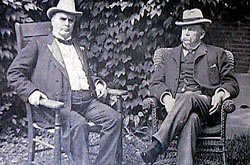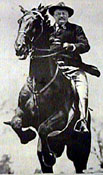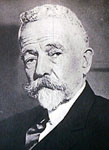Republican Philadelphia
GOP Convention of 1900 in Philadelphia
Historians say there was no suspense or excitement surrounding the Republican Convention of 1900.

William McKinley and Garrett A. Hobart
True, there was no doubt that President William McKinley would be nominated for a second term without opposition. But McKinley's vice president, Garrett Hobart, died in 1899.
As the delegates began to arrive in mid-June, Philadelphia newspapers were filled with banner-headlined, front-page stories detailing the ever-shifting list of possible vice presidential candidates. It was delicious reading for those who enjoyed the game of political chess. It was the era of the political "boss-kingmaker." In the selection of a vice presidential candidate, the game pitted the king of all GOP kingmakers, Mark Hanna of Ohio against the bosses of New York, Thomas C. Platt and canny Pennsylvania kingmaker Matthew Quay.

Teddy Roosevelt and horse
In the end the Platt-Quay candidate, Gov. Theodore Roosevelt of New York, was given the nomination, but more on that contest later.
In order to land the convention, national party chairman Hanna demanded the large sum of $100,000. It was soon raised by a committee composed of business leaders and city officials. The Walton Hotel on Broad Street was the unofficial center of things, but the convention itself was held on the west bank of the Schuylkill River at 34th and Spruce streets.
It was a temporary exhibition hall located where the current abandoned Civic Center Convention Hall (dating to 1931) now stands. Next door was the now-empty Commercial Museum. The meeting hall — which was demolished about two years after the convention — could seat 20,000 and was filled to capacity during the three-day convention. Delegates arrived at the Hall in packed trolley cars, horse-drawn cab or strolled the two miles from Center City.
The city was mobbed. Business streets were decorated. The Inquirer bragged of its sign that stretched across Broad Street composed of 2,000 electric light bulbs spelling out "PHILADELPHIA INQUIRER. LARGEST REPUBLICAN CIRCULATION IN THE WORLD." When the sign was turned on "an involuntary outburst of exclamation of admiration arose from the onlookers," the newspaper declared.
Scalpers were asking $5 to $60 for spectator seats. Swarms of street hawkers peddled souvenirs at hotels and the convention hall. A delegation of black leaders arrived in town to plead for a firm stand against lynchings and seeking support for Negro voting rights in the South.
The credentials committee had to contend with a plethora of disputes. Seven different delegations arrived from Alabama. A "lively fistfight" between two Texans vying for a delegate seat ended when one drew a knife and onlookers separated the combatants.
The GOP staged a huge nighttime parade on Broad Street with 25,000 marchers. A fleet of riverboats provided a cruise on the Delaware River for 20,000 fun-seekers.
At the convention hall, a contingent of graybeards who had attended the party's first national convention in 1856 at Musical Fund Hall sat up front as honored guests.

Henry Cabot Lodge
Party Chairman Mark Hanna opened the convention and turned the gavel over to permanent chairman, Sen. Henry Cabot Lodge of Massachusetts.
The convention was competing for newspaper space with two dramatic and exciting international stories: the Boxer Rebellion in China and the Boer War in South Africa.
But local newspaper provided saturation coverage of the convention with many artists' sketches of the action and by adding special convention sections. In addition to its regular staff, The North American hired eight "famous Americans" to comment on the proceedings, including feminist Susan B. Anthony; a United State senator; the wife of the governor of Kentucky and a noted humorist.

Mark Hanna
The bulk of the news focused on one hot topic, the vice presidential contest. Hanna had his favorites, and in the beginning it seemed like the Ohio boss would pick whomever he wished. When Hanna arrived in the city, the Inquirer headline declared "Dolliver and Long Lead for Second Place." A couple of days later the North American declared, "Hanna Punctures Many Vice Presidential Booms Leaving Only Bliss and Allison in Race."
The names Hanna floated were considered "administration men," those under control of the boss. Hanna despised Roosevelt. But soon the local headlines read, "Pennsylvania Leads the Roll of the States in Grand Rush to Roosevelt."
Boss Quay was taking great delight in outmaneuvering Boss Hanna. Quay had introduced a resolution that would have the effect of cutting considerably the voting power southern states in the next national GOP convention.
But Quay let frantic southerners know that he would be willing to drop the resolution if they supported Roosevelt. There was soon a Roosevelt stampede.
In part, Quay had engineered the move as a favor to his New York ally Boss Platt. The Rough Rider was one man Platt could not control, and he wanted him out of Albany.
Roosevelt, a hero of the recently concluded Spanish-American War, was extremely popular with the public. As a convention delegate, he was mobbed by cheering fans wherever he went in the city. But he did not want the vice presidential nomination and found himself pressured by the tidal wave of support to accept the dubious honor. When McKinley refused to get involved in the dispute, Hanna realized there was no point continuing his fight. Roosevelt won every delegate vote except for one — his own.
Quay had displayed considerable skill and muscle but before the convention ended, he outwitted himself. During the last session, he had the galleries packed with machine lackeys who would cheer lustily "Quay! Quay!" everytime the boss stood up. And the boss made frequent trips from his seat for refreshment.
But the press caught on to the ruse, and Quay was lampooned with great zest. Quay had the convention "packed by a hired claque," blared the headlines. The cheering section was called "The Quay Claquers" and "The Machine Whoopers."
At the close of the meeting, newspapers ran letter after letter from delegates and party leaders heaping praise upon the city: "That convention hall of yours ought to be a national affair; it is the finest in the country," wrote a delegate from Mississippi. "Philadelphia has proved herself to be one of the finest convention cities in America," wrote a Indiana politician. "Philadelphia has set a pace as a Convention City that will make all succeeding convention meeting places hustle to equal it," declared D.T. Flynn of Oklahoma.



